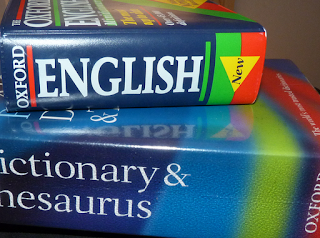I had the pleasure to indulge in reading some more of The Cat Who books the past few days. The fact that I should rather have been writing is a long story, which I won't bore you with.
As I was reading The Cat Who Went up the Creek, I came realise once again how rich the vocabulary of the author is. Words that I had to look up purely because they are not used some much anymore. Or perhaps not by people I know or come into contact with on a daily basis.
While I could look them up online, I went to my trusty Oxford Dictionary and Thesaurus first. I have to mention here that the book is on my desk within immediate reach, along with one or two other language references. To my surprise it did not have the first word on my list. Plan B. I went in search of my 1982 edition of the Oxford Concise Dictionary in our library at home. And not only was the first word in there, all the others were too. I do like to expand my vocabulary (English is my second language) but my next thought would be where I could use my new words.
In my fantasy series, The Nations of Peace, my characters have a more formal style of speech making it an opportunity to share at least some of my new words. In my daily life, I am sad to say it would make people think that I am stuck up or pretentious to use words that they have never heard of. Nor would they be able to find their meaning due to unfamiliarity with their spelling. There are exceptions of course, but still it saddens me that so few people of my personal acquaintance read books, printed or electronic. How are we ever going to evolve as a species if our level of literacy are limited to the incomprehensible characters on mobile phone messages? I have even seen that being done by authors on Facebook. That in itself is a deadly sin in my book.
My new words (thank you, Lilian Jackson Braun) are ailurophobe, badinage, rhinitis, nonagenarian, sylvan, sepulchral, Falernum, iambic and propitious.
If you come across a word in a book that you are not familiar with, do you look it up, or do you ignore it?










